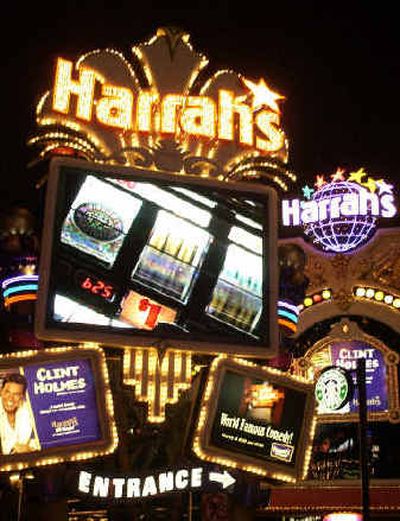Harrah’s becomes bigger player

LAS VEGAS — Harrah’s Entertainment Inc.’s $5.2 billion deal to buy Caesars Entertainment Inc. would rearrange the industry’s hierarchy, creating the world’s largest gambling company and leaving two casino giants controlling most of the Las Vegas Strip’s most-prized megaresorts.
The blockbuster deal announced Thursday eclipses last month’s $4.8 billion MGM Mirage merger with Mandalay Resort Group.
Harrah’s not only leapfrogs MGM Mirage on the world stage, it gains the high-profile place it has long sought in Las Vegas – if regulators approve the deals, possibly by next year.
The transactions would leave 15 major hotel-casinos in the gambling capital in the hands of the two combined companies, and both would be competing for a broad spectrum of tourists. Of the 32 hotel properties on the Strip, about 25 are considered major.
“These are the right assets for the development of our strategy,” Gary Loveman, Harrah’s president and chief executive, said in a conference call Thursday to announce the agreement. “We believe that these assets are worth more in our hands than in the incumbent’s hands. We believe we have acquired them at a reasonable price.”
Under terms of the deal, Harrah’s will pay $1.8 billion in cash and exchange about $3.4 billion in Harrah’s stock for all shares of its Las Vegas-based rival.
Harrah’s also will assume about $4.2 billion in Caesars Entertainment debt.
The offer to buy Caesars caught some gambling analysts off guard because Loveman had said he wasn’t interested in the company when MGM Mirage was negotiating to buy Mandalay. Loveman changed his mind after that agreement was signed and opened talks with Caesars last month, a source familiar with the negotiations said.
With the marriage, Harrah’s would immediately be able to cater to a wealthier clientele with the addition of the newly revamped Caesars Palace. Harrah’s has traditionally attracted more casual yet loyal gamblers.
The buyout gives Harrah’s a major presence on the Strip, one of the company’s strategic goals. Before, it only had Harrah’s on the famous stretch and the off-Strip Rio.
“Caesars provides us access to new markets and new customers,” Loveman said.
Harrah’s also would be able to use its technology and extensive customer database to help improve the bottom line at the underperforming Caesars properties.
MGM Mirage, with its cash buyout of Mandalay Resort Group, would own the glittery Mandalay Bay, the Bellagio, MGM Grand, The Mirage and Circus Circus among others.
But MGM Mirage, with revenues of more than $6 billion, would find itself second to Harrah’s and its total revenues of about $8.8 billion. That number could drop if the company must divest properties to appease antitrust regulators.
Currently, Caesars and Harrah’s both operate 28 casinos each, doing business in Mississippi, Indiana, New Jersey, Louisiana, Illinois and North Carolina. Caesars also runs casinos on four continents. Together, Harrah’s would have more than 95,000 employees.
Standard & Poor’s said Thursday it “expects that Harrah’s will divest assets in some jurisdictions as a result of the combination. Harrah’s will own three gaming licenses in Indiana but regulations permit ownership of only two plus 10 percent of a third.”
Also on Thursday, Standard & Poor’s revised its rating outlook on Harrah’s Entertainment Inc. to negative from stable.
“The outlook revision on Harrah’s reflects the increase in financial leverage that will occur as a result of the transaction,” according to Standard & Poor’s.
Boyd Gaming recently closed a $1.3 billion deal with Coast Casinos, creating the third-largest gambling operator in the country behind Harrah’s and MGM Mirage if the deals happen. Boyd Gaming will have revenues of about $2 billion.
Mike Cowie, a former FTC merger-litigation chief and now an antitrust lawyer in Washington, D.C., said MGM Mirage probably faces more antitrust issues than Harrah’s.